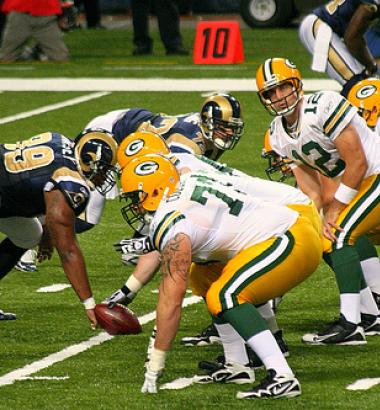
Dilemma of a Football Fan
If football is harmful to players, is it ethical to be a fan?
Football binds us together. Millions of Americans will gather to watch this Sunday’s Super Bowl. I’ll be watching at home with my dad. As Benjamin J. Dueholm put it recently, NFL football is “the central liturgical act of American civic religion.”
Dueholm is a Lutheran pastor in Wauconda, Illinois and a die-hard Green Bay Packers fan. In the Winter 2013 WQ, we highlighted his reluctant but compelling argument against American football. Writing as a concerned member of the faith in The Christian Century, Dueholm says the game’s physical and possibly neurological damage to those who play it is too large to ignore.
On the face of it, the evidence is mounting that a career in professional football, or even playing in high school or college, can haunt athletes after they hang up their cleats. A four-year study completed in December 2012 of the brains of 85 deceased athletes and military veterans found at least some symptoms of chronic traumatic encephalopathy (CTE), a degenerative brain disease, in the brains of 34 of the 35 athletes who had played professional football.
These findings grabbed headlines, but the doctors behind the study cautioned against snap judgments. The players were far from a representative sample. Players’ families usually donate their loved ones’ brains to this research because they showed symptoms of CTE, such as dementia or depression, while still living.
Another group of doctors recently tested 34 retired NFL players for depression and cognitive problems. Eight players had mild cognitive impairment and eight suffered from depression. Both rates were slightly higher than normal. None of the players showed signs of CTE, and the authors noted that the diagnosis itself is sketchy. CTE “is not universally accepted, and clinical diagnostic criteria have yet to be established.”
Football’s damage to the rest of the body is more easily documented. Several weeks ago, Dan Le Batard of the Miami Herald wrote of the toll taken on former Miami Dolphins linebacker Jason Taylor in excruciating detail. Thanks to painkillers, Taylor played through horrific injuries during his 15-season career (1997–2011). At one point, he played with such a severe calf injury that he nearly had to have his leg amputated when a condition called compartment syndrome set in.
In 2011, New York Jets defensive lineman Kris Jenkins gave a similarly eye-opening account of his NFL career. “You ever been in a car crash?” he asked a New York Times reporter. “Football is like that. But 10 times worse. It’s hell.” But it’s a hell that many players say is worth enduring. Taylor insisted to Le Batard that he has no regrets. Neither does Jenkins.
Many players do have regrets, however. Some 4,000 players and their families—including the families of several players who have committed suicide, possibly as a result of CTE—are suing the NFL, charging that the league covered up the long-term effects of head injuries. Paul M. Barrett fully explores the case—and the NFL’s proactive response—in the latest Bloomberg Businessweek.
The NFL is only half the story. College and high school football pose grave risks to amateur athletes. On the professional front, Harper’s writer Nathaniel Rich recently spent time with the New Orleans VooDoo of the Arena Football League. The league’s small field, padded walls (there are no boundaries), and special rules encourage spectacular collisions. AFL players lay their bodies on the line for a shot to play in the NFL. Few make it. Rich tells of 31-year-old Josh Bush, a diminutive kick returner deemed too small for the NFL. “But he had been playing football since he was eight,” Rich writes, “and he refused to give it up.”
As a fan, I can’t imagine giving it up either. Can’t football be made safer? Dueholm doesn’t think so, and he may be right. I’ll still tune in to the Super Bowl on Sunday. I’ll savor the warm company of family and the shared enthusiasm for the game. I’ll admire the dedication of the players, many of whom say that theirs is a choice and a privilege to play at the highest level. But I’ll be more conscious than ever of football’s dangers. Watch—and play—with care.
Photo by Darin House via Flickr